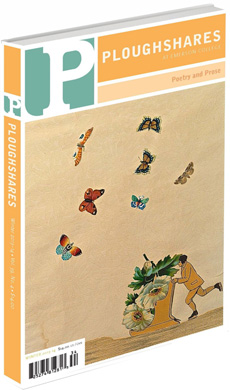Two Poems (Emerging Writer’s Contest Winner: POETRY)
In poetry, our winner is Josephine Yu, for her poems, “Never Trust a Poem That Begins with a Dream” and “Narcissist Revises Tidal Theory.”
Ploughshares’ poetry editor, John Skoyles, writes: “Josephine Yu’s poems are alternately sprightly and grave, saucy and sincere. You never know what you might find: a Catholic school girl blouse next to the ‘soft snipping sounds’ coming from a biology class dissecting frogs and fetal pigs. Galileo and Kepler among chewed pens, dinner trays, and snow globes. Her energetic writing holds all of these disparate elements, figures, and images together. The voice is strong and sure, stronger for its moments of self-doubt, self-criticism, and self-consciousness. We believe this speaker: her poignant and hilarious wit is finally deeply touching. These poems are omens she has taught us how to read.”
Josephine Yu earned an MFA from Georgia State University and a PhD from Florida State University. Her poems have appeared in journals including The Southern Review, TriQuarterly, River Styx, and the Beloit Poetry Journal, and she has been honored with Meridian’s 2010 Editor’s Prize, the New Letters 2010 Poetry Award, and the New Letters 2010–2011 Readers Award for Poetry.
“These poems were attempts to write about difficult topics,” Yu writes. “Didn’t Oscar Wilde say the most frightening words in the English language are ‘I had a very interesting dream last night’? Just as dangerous as dreams are the expansive feelings I get when walking on the coast of St. George Island. I always want to make grand, Whitmanesque pronouncements about the ocean but know I can’t get away with them. I looked for a persona who wouldn’t feel self-conscious or worry about being sentimental, and I found the narcissist, my hidden narcissist.”
Never Trust a Poem That Begins with a Dream
unless it’s a love poem or the dream is the one you keep having
where you leave a raucous party—the kind of party you’re never
invited to—and sit on the balcony, just starting to tear up but not yet
crying. Most nights the balcony is the second-story walkway of a motel
and the party is in full swing in the room behind you—The White Stripes
vibrating the stucco and someone’s cigarette, you imagine, burning
holes in the bedspread. A man always follows you out, and as you’re trying
to remember who said “Loneliness is the first thing which God’s eye named,
not good,” he puts his arm around you and whispers
something you never remember when you wake up, like the scene
in an arty film where you don’t get to hear the mumbled last words.
Some nights he’s the boy you had a crush on in eighth grade
who did, in fact, put his arm across your shoulders in the cafeteria, sparks
cascading down your back, under the Peter Pan-collared Catholic school girl
blouse you wore un-ironically, being a Catholic school girl.
Other nights he’s the biology teacher who told oral sex jokes but
let you take a C minus instead of dissecting the frog and fetal pig, even let
you leave the room during the dissecting, to escape that sharp odor
and soft, snipping sounds. But in the dream you aren’t thinking
how amazing it is you even graduated, given how much
you refused to do and how often you skipped class to get stoned
behind the library, and you’re not realizing gratefully how many concessions
pity won you. Instead you’re noticing how his breath on your ear
lets you feel those delicate folds of skin you rarely think of,
the way wind moving through grass lets you see the separate blades.
But then you start to notice, too, the same adult-touching-a-child-
in-an-overly-intimate-but-not-quite-inappropriate-way ickiness you felt
when a family friend stroked your silky seven-year-old head and promised,
“I’ll take you away with me. You’ll be my child bride.” And then
you remember—in the dream—the joke the biology teacher told that ended
“sucking the chrome off a trailer hitch.” Other nights he’s the dentist who
tightened your braces or the guy in college who sang you “Purple Rain”
while he played a keyboard, whom you felt sorry for and kissed.
Or the Pakistani dry cleaner who proposed, pledging robust sons
and starched slacks. But on the best nights, when you’ve fallen
asleep with the right mix of herbal tea and Law and Order reruns,
he’s your husband,
the one you had or have or will have, your husband’s arm
the right weight and length to drape your shoulders as you brood
“which God’s eye named, not good… which God’s eye named,
not good” and his voice is warm in your hair, answering,
“It was Milton. Ready to go home?”
Narcissist Revises Tidal Theory
In questions of science, the authority of a thousand is not worth
the humble reasoning of a single individual.
—Galileo
The October coast is not where one turns for comfort, yet
I’m drawn again to this abandoned stretch of rock and spray
where the thin-lipped horizon coughs a few rheumy clouds
and the wind grates its serrated edge against my neck.
Why? I find little pleasure in the sandpiper’s mocking hops,
his parody of delight a foil to my despair, and the waves keep
repeating like a proverb, some once-useful warning now clichéd.
Galileo saw the tides as water sloshing in a pan, the earth’s rotation
the cause, and admonished Kepler’s folly for believing
the moon is the force which incites the waters to a tumult.
Both were fools. The tides are the metronome of my regret, powered
by perpetual hindsight. They set the currents spinning in a gyre
that collects the flotsam of my affairs—plastic spoons and condoms,
frozen dinner trays, snow globes, souvenirs, chewed pens, the woven
mesh of lawn chairs, a cooler lid, nurdles of exfoliating soap—and sends
it swirling in the Pacific to tangle in seaweed and clog seagulls’ throats.
In return, the tides fork over a drying branch of coral, some worthless
shells, or sometimes a small shark, half-buried in a shallow sandbar,
whose flesh, when pressed, has unexpected give and whose discrete
cerulean eye glints like an omen I should know how to read.



